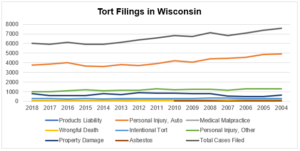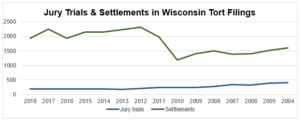In a 4-3 decision on June 21, the Wisconsin Supreme Court affirmed that the Legislature’s 2018 extraordinary session was constitutional in League of Women Voters v. Evers (2019 WI 75), thus upholding 2017 Acts 368, 369, and 370 and the confirmation of 82 appointments.
Background
The Wisconsin Legislature passed three laws limiting the power of the attorney general and the governor in a “lame duck” extraordinary session in December 2018, after Gov. Tony Evers was elected but before he took office. Additionally, the Senate approved 82 former Gov. Scott Walker appointees in the December extraordinary session.
The League of Women Voters and other plaintiffs subsequently filed the instant lawsuit seeking to overturn the laws and appointments. The League argued the Legislature does not have the constitutional authority to convene an extraordinary session.
Decision
The Supreme Court opinion, authored by Justice R. Bradley (joined by Chief Justice Roggensack, Justice Kelly, and Justice Ziegler) rules in favor of the Legislature, finding the Legislature constitutionally met to vote on the laws and the appointments.
The court said the Wisconsin Constitution authorizes the Legislature to meet only as provided by law or when convened by the governor (Wis. Const. Art. IV, § 11). Wis. Stat. § 13.02(3) provides that the Legislature can implement a work schedule. The Legislature provided a work schedule for the 2017-18 session in 2017 Senate Joint Resolution 1, specifically stating that any days not reserved for scheduled floorperiods are available for the Legislature to convene an extraordinary session. Furthermore, Art. IV § 8 of the Constitution provides that “Each house may determine the rules of its own proceedings.” Therefore, the court ruled the Legislature met as provided by law under the Constitution and Wis. Stat. § 13.02(3).
The League of Women Voters argued that 13.02(3) only authorizes “regular” sessions, not “extraordinary” sessions. However, the court said the lack of the work “extraordinary” in the statute does not make it unconstitutional.
Regarding separation of powers arguments, the Supreme Court said the circuit court’s decision ruling the extraordinary session unconstitutional improperly encroached on the Legislature’s constitutional powers. While the courts can determine whether laws enacted by the Legislature are constitutional, courts do not have jurisdiction over how the Legislature enacts laws.
Dissent
Justice Dallet’s dissent (joined by Justices Abrahamson and Walsh Bradley) would have affirmed the circuit court’s decision blocking the extraordinary session laws. The dissent said the court’s reading of the constitutional provisions would give the Legislature unlimited authority to convene, which was contrary to the intention of the drafters of Art. IV, § 11. Furthermore, the joint resolution allowing the Legislature to meet for extraordinary sessions was not “law” as required by Art. IV, § 11.
There are other cases both in state and federal court seeking to declare the extraordinary session laws unconstitutional. Read more about the other litigation here.


